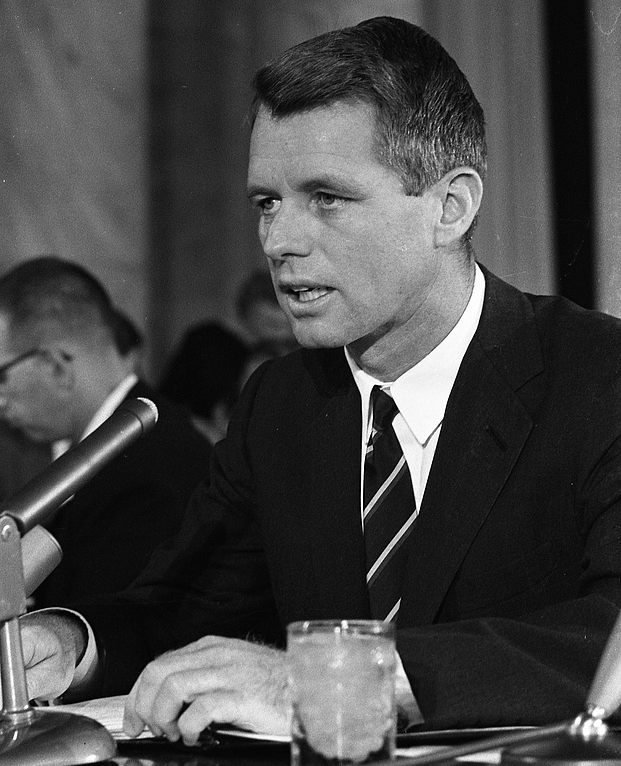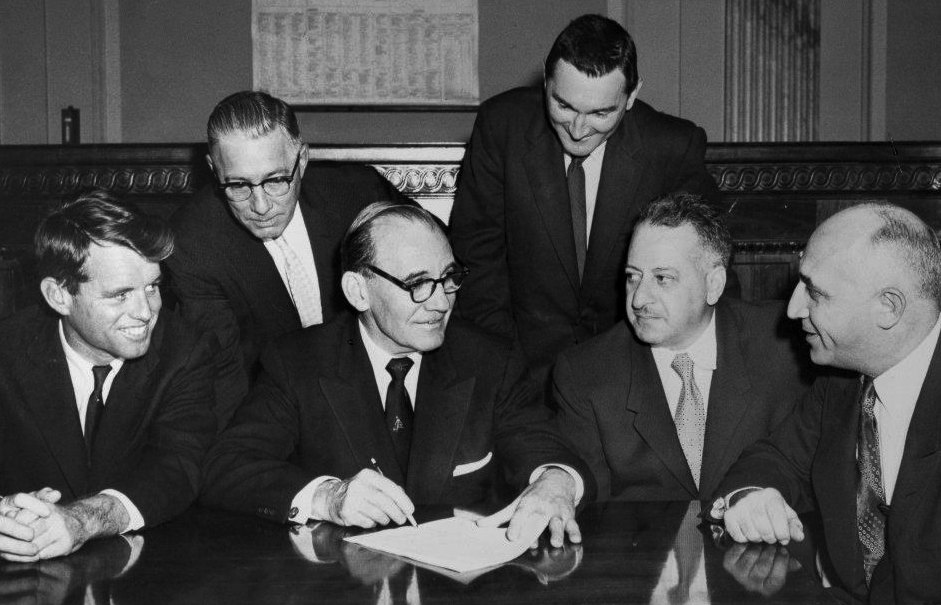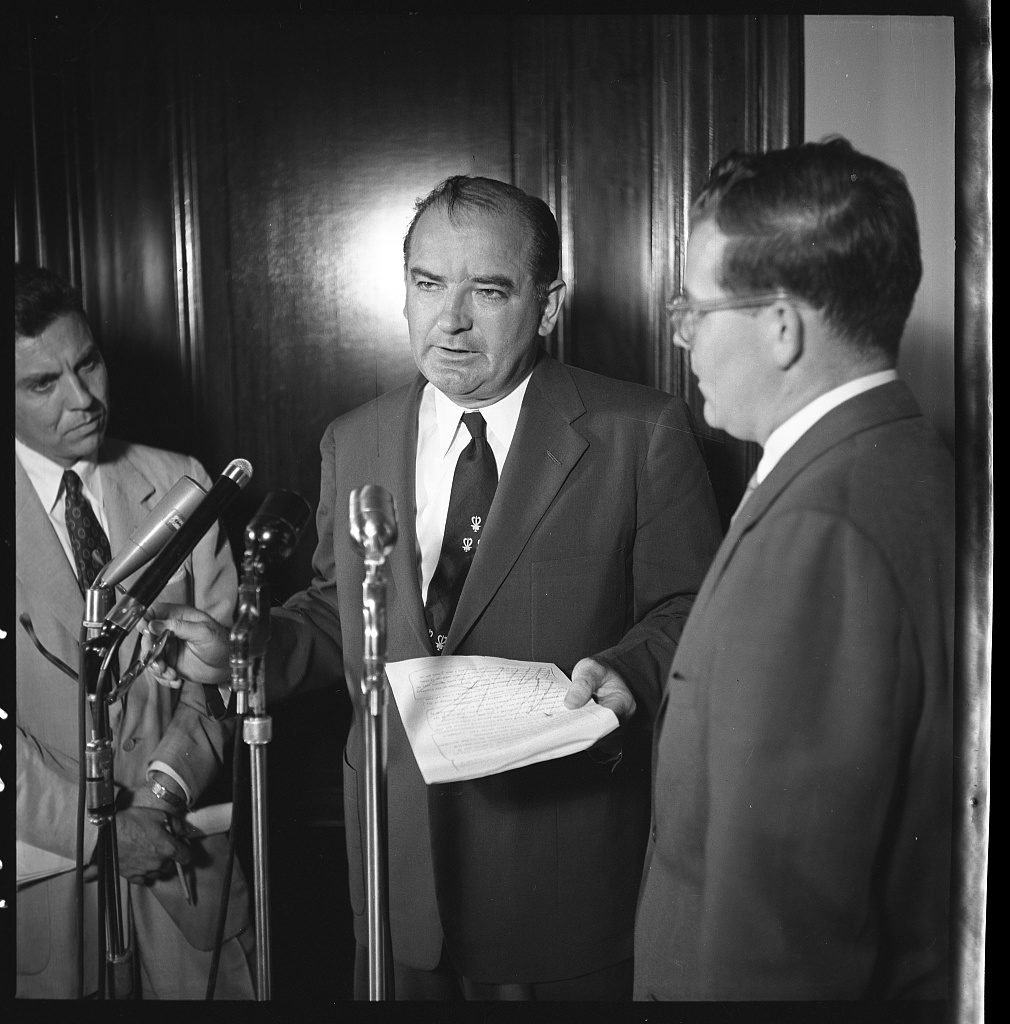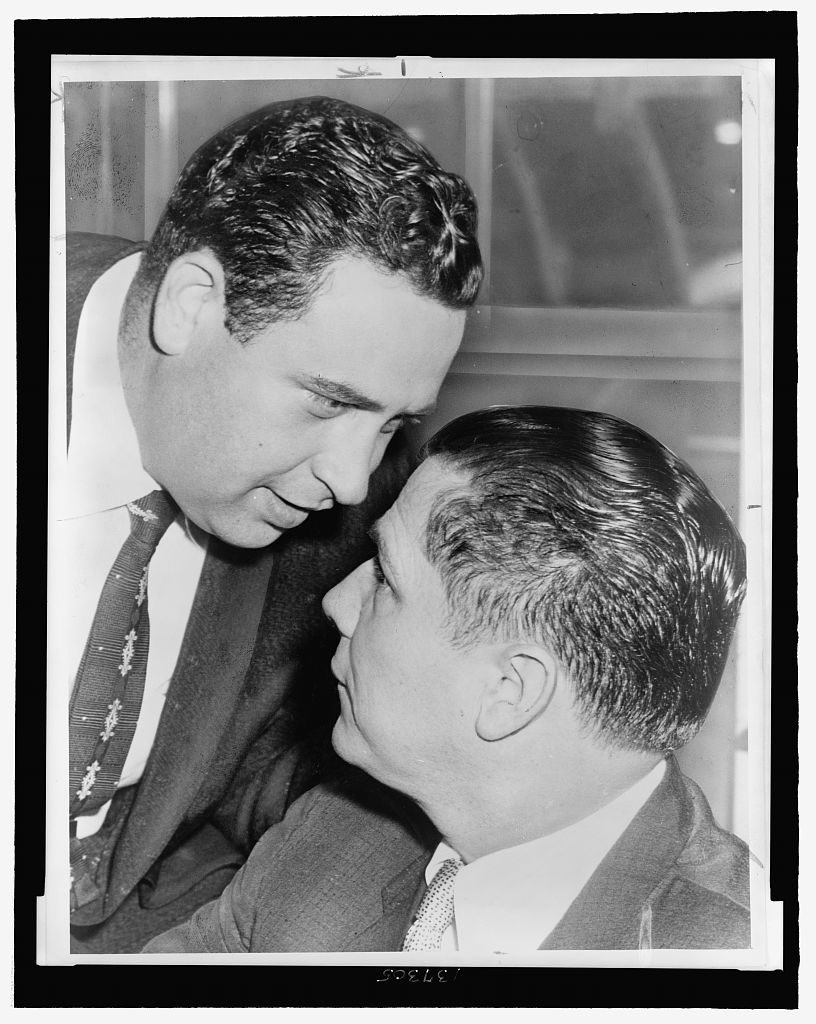Robert F. Kennedy’s crusade against the Mob: Part 1
As nation recognizes the 50th anniversary of his assassination, RFK remembered for leading federal assault on organized crime

First of Three Parts
In a lengthy memo to his brother President John F. Kennedy, dated January 10, 1963, meant for publication in America’s Sunday newspapers, Attorney General Robert F. Kennedy reported on the progress on what he considered the highest priority of federal law enforcement:
“Dear Mr. President: The Administration during 1962 greatly expanded its coordinated drive against organized crime and racketeering.”
Robert Kennedy touted the fact that prosecutions for racketeering by his Organized Crime Section in the Justice Department rose by 300 percent above 1961 and convictions of organized criminals grew by 350 percent. He celebrated the coordination of the FBI, Secret Service, IRS and 23 other federal law enforcement agencies that helped him compile information on the nation’s 1,100 top racketeers. He noted there were more than 60 federal lawyers on his section team, up from 17 in 1961. Five of the administration’s anti-racketeering bills pushed by RFK and passed into law by Congress in 1961 had led the FBI to pursue 852 new cases against hoodlums and grand juries to indict 134 defendants in federal courts. The number of suspected hoods indicted reached 350 in 1962, compared with 49 in 1960. And recent convictions won by Kennedy’s prosecutors included mobsters Anthony “Tony Ducks” Carello, Carmine Galante and John Ormento, Frankie Carbo, Frank “Blinky” Palermo and Alfred Sica.

As the 50th anniversary of the assassination of Robert Kennedy in Los Angeles is recognized this week – he was shot on June 5 and died on June 6 – one aspect of his complex legacy is less likely to be emphasized: his unprecedented crusade to expose and prosecute the Mob in America in the late 1950s and early ’60s. It was a time when the national syndicate held considerable power and influence over business, entertainment, unions, illegal gambling, prostitution, politics, the courts, and all levels of government and law enforcement.
RFK has been described as a ruthless, puritan, willing to use extralegal means to his own ends. His excesses with warrantless (and likely illegal) wiretaps and bugging of the homes and meeting places of mobsters and Mob associates – to obtain raw intelligence not useable in court – in the early ’60s caused him political grief when the secrets were revealed a couple of years later.
Minutes before hearing the shooting of John F. Kennedy in an open convertible in a motorcade in Dallas and his death about half an hour later on November 22, 1963, RFK had just ended a meeting on organized crime with Justice Department officials at his estate at Hickory Hill in McLean, Virginia, outside Washington. FBI chief J. Edgar Hoover called him at home to dryly inform him of the shooting and later the president’s death. That afternoon, RFK, who for years had pursued Mob-connected figures such as Teamster Union president James Hoffa, wondered whether his unprecedented national campaign to battle organized crime – the “Mafia,” “La Cosa Nostra” – as chief counsel for the Senate Rackets Committee and as attorney general caused the Mob to retaliate by assassinating his brother.
When Ed Guthman, spokesman for the Justice Department, rushed to Hickory Hill to speak with his boss that day, RFK said: “There’s so much bitterness. I thought they’d get one of us. … I thought it would be me.” Then Walter Sheridan, head of RFK’s “Get Hoffa Squad” at Justice, arrived. Sheridan had heard the year before from an informant about Hoffa’s expressed desire to kill RFK. Both men agreed that Hoffa was now a suspect in JFK’s murder. RFK sent Sheridan to Dallas to investigate, behind the scenes.
Roots of Organized Crime Crusade
Bobby Kennedy’s enthusiasm for rooting out the Mob started in the mid-1950s. By then, the Massachusetts native had worked in a series of high-profile, and in some cases, controversial legal positions in Washington and New York while only in his 20s. After graduating from law school and passing the New York bar exam at age 25 in 1951, Bobby was appointed assistant U.S. attorney in eastern New York thanks to calls made by his powerful, multimillionaire father, former Ambassador to England Joseph Kennedy Sr., known as “Old Joe,” and his father’s good friend, Republican Senator Joseph McCarthy.
But Bobby resigned only months later because of a pressing family obligation –
managing the campaign of his brother, Congressman John F. Kennedy, for U.S. senator from Massachusetts in 1952. Awkward and inarticulate at first, RFK steered his brother and campaign staffers past Old Joe’s constant interfering to victory at the polls. A campaign aide, Kenneth O’Donnell, RFK’s roommate at Harvard, would say that without Bobby’s management during the campaign, “Jack Kennedy most certainly would have lost the election.” Jack’s win as a Democrat in 1952 was an exception, as the Republicans rode presidential candidate Dwight Eisenhower’s coattails to a majority in the Senate.
McCarthy, a Kennedy family pal who occasionally socialized with Bobby’s sisters Jean and Pat, stoked a bitter national debate that would follow RFK for the rest of his life. RFK and brother Jack were early, if temporary, supporters of McCarthy and his anti-Red campaign and remained anti-Communist if less strident into the 1960s. RFK, who unlike Jack worked on the committee and questioned witnesses on TV about their Communist pasts, would regret his alignment with McCarthy.
Anti-Communist Era
As part of the Republican majority in the Senate, McCarthy was appointed chairman of the Senate Permanent Subcommittee on Investigations. The subcommittee was supposed to investigate government operations – such as procurement spending — and national security. McCarthy determined it had to focus on allegations (or his suspicions) of Communist sympathizers in the federal government, from the U.S. Army and State Department to the Voice of America. Old Joe soon telephoned McCarthy to line up a job on the subcommittee for Bobby, who thus secured a position as assistant counsel to McCarthy’s panel in January 1953. McCarthy gained national prominence during this time, known as the “Red Scare” era, amid fears of espionage by the Soviet Union while American soldiers fought Communist Chinese forces in the Korean War. He directed his fierce demagoguery during televised sessions known as the Army-McCarthy hearings against those he felt were followers of Communism in and out of the federal government. His tactics included badgering witnesses, flouting Senate procedures and other misconduct that led to his political decline as the war in Korea ended. The Senate, citing his abuse of power, voted to censure him in late 1954, ousting McCarthy from chairing the subcommittee.

Theodore Sorenson, a close aide to JFK, once described Bobby’s character in this period of 1953 to 1954 as “militant, aggressive, intolerant, opinionated, somewhat shallow in his convictions . . . more like his father than his brother.”
In 1955, McCarthy’s career was in ruins, the red-baiting Army-McCarthy hearings over. The Democrats were back in the majority in the Senate, and the Permanent Subcommittee made Bobby its chief counsel. This time, he took an interest in corruption in government. While researching the topic and talking to journalists, he keyed on reports of organized criminals who infiltrated labor unions to extort money from leaders and rank-and-file members. The year before, the acclaimed movie On the Waterfront, depicting a violent Mob boss who takes control of a longshoremen’s union in New York, appeared in theaters across the country.
When RFK started asking questions of federal authorities about organized hoodlums, he soon realized that the FBI would be of little benefit on the subject. FBI director Hoover – also a close friend of Old Joe’s – stood in full denial that a national crime syndicate existed, in order to avoid the possible corruption of his agents and to direct much of their work toward investigating alleged Communist conspiracies in the United States, along with the usual bank robberies and kidnappings. Kennedy, however, learned that another federal investigative agency, the Bureau of Narcotics, knew full well about the decades-long involvement of organized crime in pushing narcotics. Two of the Narcotics Bureau’s agents in New York, Angelo Zurlo and Joseph Amato, educated RFK about the Sicilian roots of American organized crime. They in turn put him in touch with their fellow narcotics investigators. Bobby accompanied New York police officers to tense nighttime drug busts from 1955 to 1956 and learned more in long conversations with them, fascinated by the real world of cops and crime he’d witnessed.
News coverage of “racketeers” in the newspapers and national magazines had become routine by the mid-’50s. In one major event in 1956, syndicated news columnist Victor Riesel, who wrote often about labor racketeering in New York, was blinded by a man (hired by a Mob associate, as it turned out) who threw acid in his face. RFK took time out again that year to get his brother Jack on the Democratic Party ticket as vice president under presidential nominee Adlai Stevenson.
Targeting the Teamsters
Following Jack’s defeat in that effort at the party convention (to Senator Estes Kefauver of Tennessee), RFK was approached by reporters who watched him work with McCarthy’s committee. They urged him this time to investigate labor racketeering – for instance, top officers of the International Brotherhood of the Teamsters, Dave Beck, president, and Hoffa, vice president. The Teamsters controlled the $250 million its members contributed to their retirement pension fund. One reporter, Clark Mollenhoff, reminded RFK that probing organized crime made a name for Senator Kefauver, who had just defeated Jack in the vice presidential race. Kefauver had chaired a Senate committee probe centered on organized crime in interstate commerce – with many of its hearings televised live – from 1950 to 1951. (One of those Kefauver hearings was conducted in the federal courthouse in Las Vegas, the building that houses The Mob Museum today.)
Bobby started visiting with journalists in various cities to talk about organized crime infiltrating the Teamsters, the nation’s largest labor organization. His contacts persuaded him to travel to Los Angeles, Seattle and Chicago, along with his crack investigator Carmine Bellino, to hear stories of extortion tactics by the Teamsters. In Chicago, they viewed accounting books kept by Teamster President Beck. The records convinced RFK that Beck was misappropriating money from the Teamsters, which then had 1.5 million members.

RFK would later recall thinking that at that moment “we had come to the startling but inescapable conclusion that Dave Beck, president of America’s largest and most powerful labor union, the Teamsters, was a crook.”
He determined that labor corruption by the Teamsters had to be the next major focus of the Senate committee. But RFK’s decision would result in another clash with his father, who in the past had secret business ties with hoodlums. Old Joe became furious when he learned about his son’s intent to investigate organized crime influence within labor unions. His sister Jean described an incident during Christmastime in 1956 when Joe blasted his son for being ignorant and putting his brother Jack in danger of losing the important backing of labor unions for Jack’s intended run for president in 1960. Joe later enlisted Supreme Court Justice William O. Douglas to try to talk Bobby out of it, but he wouldn’t budge. Days later, Bobby met with and convinced the new chairman of the committee, Senator John L. McClellan of Arkansas, to investigate union corruption. The Senate unanimously approved the creation and funding of the eight-member Senate Select Committee on Improper Activities in the Labor and Management Field. Soon nicknamed the Rackets Committee, it was tasked to probe corrupt acts by both labor and management. Preparations were made to begin by focusing on Teamsters Union leaders in Chicago, Detroit, Los Angeles, New York and Portland.
Over the coming months, the Rackets Committee would hear testimony exposing 49 mobsters closely associated with the Teamsters, 141 Teamsters officers tied to improper or criminal activities and hear 73 of the union’s officers plead their Fifth Amendment rights to avoid answering questions. The committee received tens of thousands of letters and telegrams from across the country from union members and others “pleading for help,” McClellan wrote in 1962, “against racketeers and pledging aid to investigators even though some of the correspondents were afraid of violent reprisal.”
Feedback or questions? Email blog@themobmuseum.org





